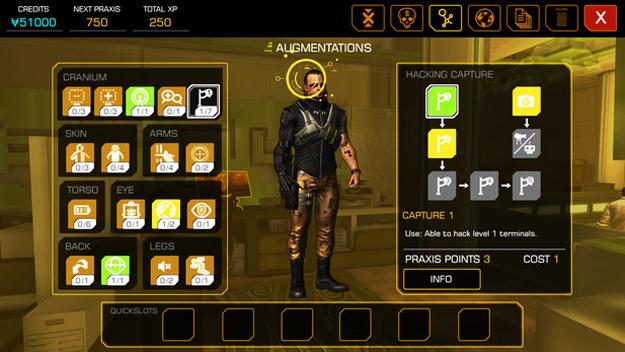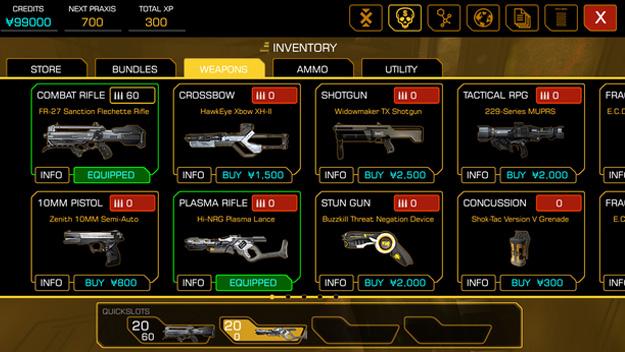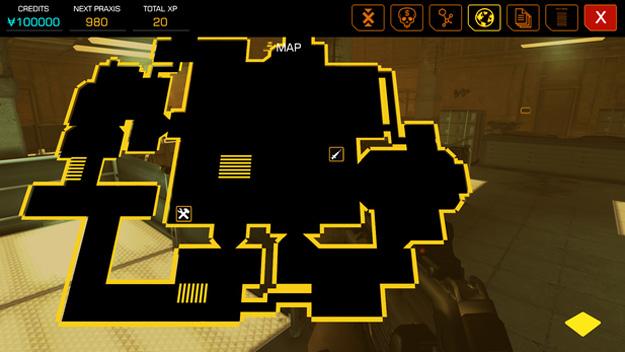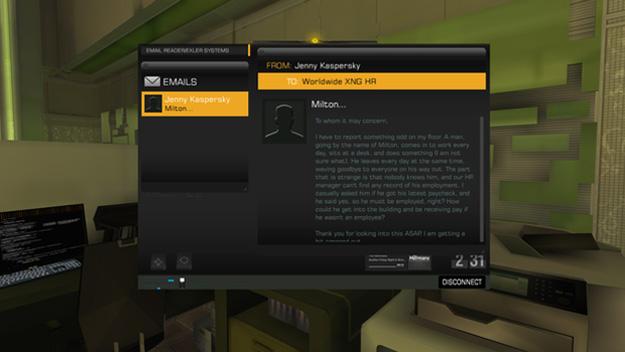“"The denizens of Deus Ex : The Fall need to learn to memorize their pass codes without first emailing them to everyone they know."”
- Sometimes feels like the Deus Ex you know and love
- New inventory system puts a fun arsenal at your fingertips
- Crashes so frequently it's barely playable at times
- Enemy AI is absolutely idiotic
- Story is one long, uninteresting fetch quest
Mobile games are getting closer and closer to offering a Triple A gaming experience, so you’d be forgiven if you expected Deus Ex: The Fall to be a true sequel to 2011’s Deus Ex: Human Revolution. It was even announced like a triple-A game, with a day of teasers and a slick reveal last month. Sometimes it even looks like a console game, as long as you don’t look too closely. But almost the moment it starts, the staples keeping the experience together begin to loosen and the weaknesses of the mobile platform start to show.
The story in The Fall has some characters in common with Human Revolution, and is connected to the 2011 tie-in novel Deus Ex: Icarus Effect. Despite those roots there’s unfortunately little of interest here. It begins on somewhat solid ground, with a British mercenary leaving a group of physically augmented cyborg terrorists after finding out they set him up. But what follows is one long fetch quest as you head to Panama in search of the drug neuropozyne, a requirement for augmented individuals that’s in short supply. Other than the prologue, the whole game takes place in one uninteresting city. And don’t expect it to actually go anywhere; the tale ends before it even begins, leaving plenty of room for the planned sequels. Too much room, in fact.
Problems appear immediately. The best mobile games use the strengths of the platform to their advantage; DE: TF merely skirts around mobile’s weaknesses. The touch controls are passable at best, and actively detrimental at other times. Their very nature makes it all but impossible to move, look, and shoot at the same time, and the targeting system is laughable. They’re also wildly inconsistent; sometimes touching objects activates them, and sometimes you have to touch a pop-up instead. Swiping around on the left side of the screen should cause protagonist Ben Saxon to walk and strafe, but it sometimes inexplicably causes him to look around instead. Without solid controls the gunplay is a mess.
The issues don’t stop there. iPhones and iPads simply don’t pack the horsepower to run a game like what The Fall was clearly meant to be. It looks great in official screenshots, but characters and environments alike suffer up close. NPCs repeat the same half dozen lines endlessly, and they’ll often stay completely cool as you execute police officers in front of them or steal their beers from under their noses. Their behaviors rarely make sense, and the enemy AI is absolutely bottom-of-the-barrel stupid.
Deus Ex: The Fall has plenty of high points, but even at its best all they can really do is temporarily mask the game’s many flaws.
Even with all those problems, there is an enjoyable game buried somewhere in Deus Ex: The Fall. When the controls decide to work and you’re sneaking around avoiding cameras and stun-gunning meathead guards, it feels remarkably like Human Revolution. It draws you in in quite the same way. Many of the mechanics from that game return, for better or worse, including the battery-based stamina system and that damn hacking mini game. Other mechanics are repeated to the point of parody. The denizens of this universe really have to learn to remember their pass codes without writing them down in easily hacked e-mails. They’re always just four digits long, even for the most secure safes. And love it or hate it, that smoldering black and gold aesthetic returns in full force. These tableaus are drenched in somber shades, and yes, it’s all very cyberpunk. We get it.
The inventory system is an interesting new fold. All weapons in the game are purchasable at any time from the pause menu. Microtransactions for more credits and experience are present, but not required, which is a huge plus. Most importantly that means that if you have enough credits—and they’re not difficult to come by—you can buy whatever you prefer for most situations. It;s not a bad system, and it allows for more versatility than Human Revolution.
You can complete every mission and side quest within six hours -that is, if you can get the game to play for more than five minutes at a time without crashing. Just like Human Revolution, The Fall works best when it provides a varied sandbox in which to play. Skulking through illogically placed vents, taking down pairs of foes from behind, chucking EMP grenades at hulking, rolling turrets—that’s when The Fall makes you forget how bad it can be. But all too often during missions you’re simply running from one objective marker to the next, and that’s when you remember that you’re playing a video game on a phone.
Conclusion
Deus Ex: The Fall has plenty of high points, but even at its best all they can really do is temporarily mask the game’s many flaws. Ultimately The Fall lives up to its name and falls well short of what it promises.
Highs
- Sometimes feels like the Deus Ex you know and love
- New inventory system puts a fun arsenal at your fingertips
Lows
- Crashes so frequently it’s barely playable at times
- Enemy AI is absolutely idiotic
- Story is one long, uninteresting fetch quest
(This game was reviewed on an iPad Mini, using a copy of the game provided by the publisher)







